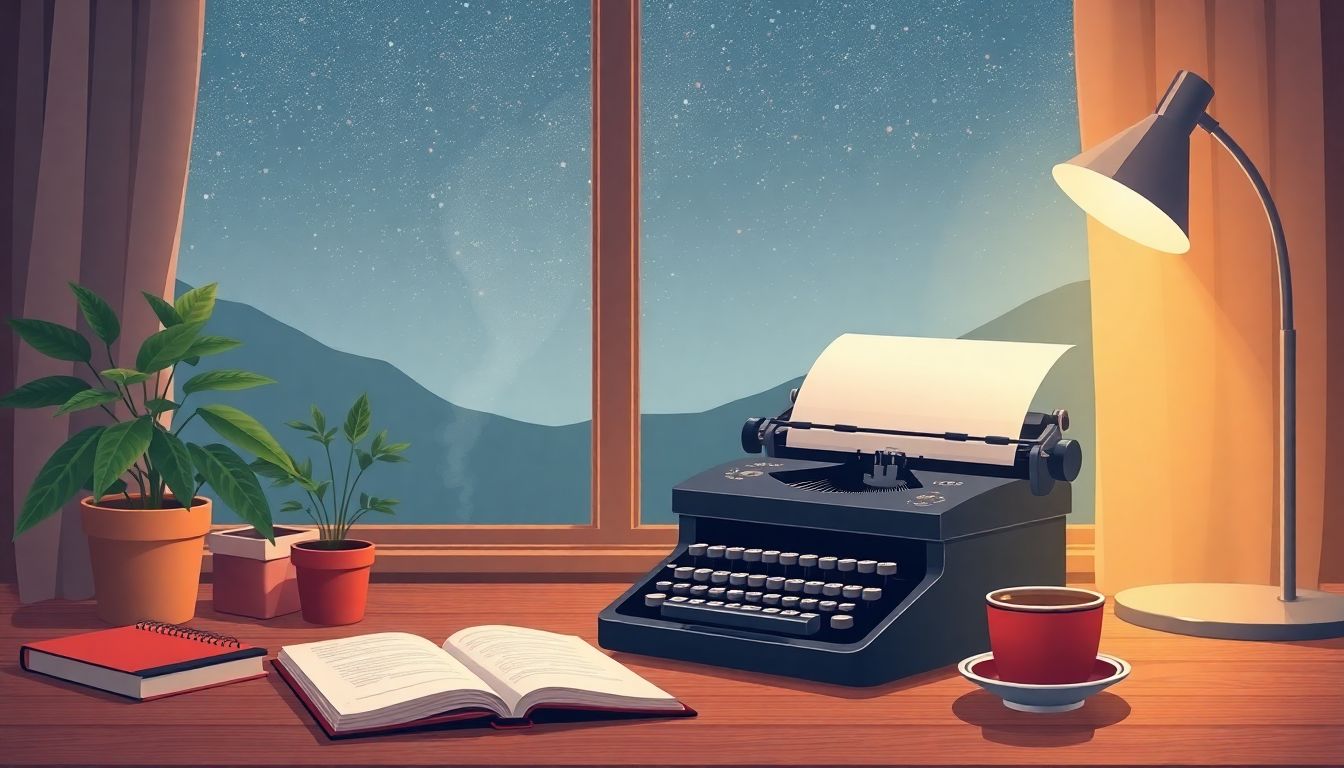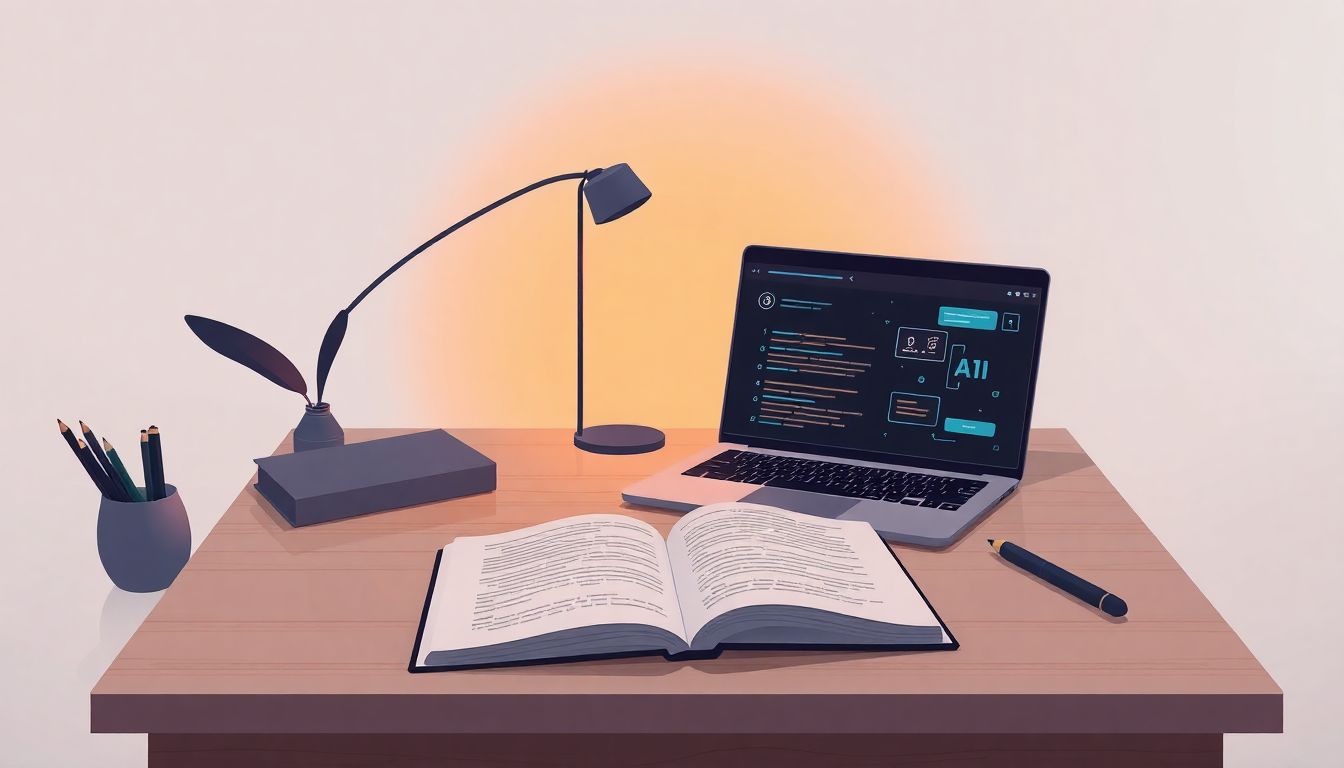If you’re diving into the world of scriptwriting for film and television, you might feel a bit overwhelmed. Trust me, you’re not alone! Many writers grapple with writer’s block, character development, and plot twists that just won’t cooperate.
But what if I told you there’s a tool that could help ease those struggles? Stick around, and I’ll show you how ChatGPT can transform your scriptwriting process, sparking creativity and making it more efficient.
We’ll explore everything from the benefits of using ChatGPT to practical tips for getting started, plus some creative prompts to get your ideas flowing. Get ready to unlock a new approach to storytelling!
Key Takeaways
- ChatGPT can help overcome writer’s block and spark creativity in scriptwriting for films and TV.
- Start with a clear script type and provide specific prompts to get tailored content from ChatGPT.
- Utilize ChatGPT for brainstorming, generating outlines, and dialogue to save time and resources.
- Experiment with various prompts and genres to produce diverse and engaging narratives.
- Always edit and refine AI-generated content to match your unique voice and storytelling style.
- Stay specific in your prompts to avoid generic responses, and embrace the editing phase for better integration.
- Maintain your creative voice and avoid over-reliance on AI for best results in scriptwriting.

How to Use ChatGPT for Scriptwriting in Film and Television
Using ChatGPT for scriptwriting can enhance your creative process, making it more efficient and enjoyable.
To leverage ChatGPT effectively, start by defining what type of script you want to write, whether it’s for a film, television show, or web series.
Then, provide clear instructions to ChatGPT to align its output with your vision.
For example, you might say, “Generate a 10-minute script for a romantic comedy about two rival bakers who fall in love.” This gives the AI a clear framework and context to work within.
Remember to refine and edit the content it generates to ensure it fits your unique voice and style.
Benefits of Using ChatGPT in Scriptwriting
There are several advantages to using ChatGPT in your scriptwriting process.
First off, ChatGPT can help you brainstorm new ideas and tackle writer’s block, providing a fresh perspective when you feel stuck.
It’s also a cost-effective solution for generating outlines and dialogues, saving you time and resources.
The ability to quickly iterate on ideas allows for collaborative writing; you can experiment with different themes and tones seamlessly.
Plus, integrating AI-generated content into your scripts can enhance overall creativity and improve script quality.
All these factors contribute to creating a more compelling narrative that resonates with audiences.
Getting Started with ChatGPT for Scripts
Getting started with ChatGPT for scriptwriting is easier than it might seem.
First, you’ll need access to ChatGPT. You can set it up through the OpenAI platform.
Once you’re in, try exploring some basic scriptwriting prompts to familiarize yourself with how the AI generates content.
Here are some prompts you can copy and paste directly into ChatGPT:
- “Write the first scene of a thriller that begins in a small town.”
- “Create character descriptions for a group of friends embarking on an adventure.”
- “Outline a 5-episode arc for a family drama series.”
After playing around with prompts, you can gradually begin drafting your scripts, using the outputs as starting points.
Types of Scripts You Can Write with ChatGPT
ChatGPT is versatile and can assist in writing various types of scripts.
Whether you’re aiming for film scripts, television episodes, web series, or even short films, it can adapt to your needs.
Film scripts can range from feature-length screenplays to shorts, while television scripts can encompass existing sitcom formats or dramatic series.
If you need to write an episode for a web series, you can prompt ChatGPT specifically for that format, ensuring that the dialogue and pacing match digital platforms.
Here’s a prompt to try: “Write a one-page outline for a science fiction feature film that explores parallel universes.”
No matter the format, ChatGPT can help you generate engaging narratives suitable for your chosen medium.

Creative Prompt Ideas for Scriptwriting
Ready to kickstart your scriptwriting journey with some ready-to-use prompts? Here’s a collection that can stimulate your creativity and lead to exciting narratives.
- “Write a dialogue scene between two rival chefs competing in a cooking competition, each trying to sabotage the other’s dish.”
- “Create a backstory for a former superhero who now runs a small bookstore and struggles to adapt to normal life.”
- “Outline a short film about an unexpected time traveler who lands in a mundane office, and their attempts to fit in.”
- “Generate character profiles for a group of misfits on a quest to save their town from a mysterious force.”
- “Draft the opening scene of a horror film set in an abandoned amusement park, focusing on the eerie atmosphere.”
Feel free to modify these prompts to better fit your vision.
The more specific you can be, the more tailored the responses will be.
Experimenting with different genres can also lead to unexpected gems.
Tips for Effective Script Writing with ChatGPT
To make the most of your experience with ChatGPT, here are some effective writing tips.
First, always start with a clear and specific prompt. The more detail you provide, the better the output will be.
For example, instead of saying, “Write a scene,” try “Write a scene where a detective confronts the prime suspect in a bustling cafe, filled with tense dialogue and hidden motives.”
Second, don’t hesitate to use iteration. Generate multiple drafts and variations of a scene to find the best fit for your story.
Set aside time to review and refine the generated text.
This is crucial for ensuring the dialogue flows naturally and aligns with your characters’ voices.
Additionally, take advantage of ChatGPT’s ability to provide character development details. Use prompts like, “Give me a list of three weaknesses for my protagonist, a young artist trying to find their voice.”
Finally, combine AI-generated content with your ideas for a more personalized script. This hybrid approach can lead to a rich narrative.
Common Challenges and How to Overcome Them
Even though ChatGPT is a powerful tool, you might face some challenges along the way.
One common issue is overly generic responses. This often happens when prompts are vague.
To counteract this, focus on crafting specific, detailed prompts that include character motivations and scenarios.
Another challenge is managing AI-generated content that may not fit seamlessly into your vision.
To overcome this, embrace the editing phase. Adapt the AI’s output to align with your unique style and narrative direction.
Writer’s block can still strike when using AI, so don’t rely solely on it. Take breaks, engage in other creative activities, or reframe your prompts for a fresh perspective.
Lastly, be aware of dependency. While ChatGPT is a valuable ally, ensure that your voice remains central to the screenplay.

Examples of Successful Scripts Generated by ChatGPT
To understand the potential of ChatGPT in scriptwriting, reviewing successful examples is key.
Many users have reported generating captivating scripts across various genres using ChatGPT.
For instance, one user created a thrilling mystery short film in less than an hour, which incorporated clever twists and engaging dialogue.
Another notable example is a comedy sketch where AI-assisted in developing witty exchanges that left the audience laughing.
Here’s a prompt you can use to explore script generation: “Generate a short romantic comedy script involving two characters who meet through a series of misunderstandings.”
These success stories highlight the diverse storytelling capabilities of ChatGPT, showcasing how it can serve as both a brainstorming partner and a writing assistant.
By examining these examples, you can gain insights into how to effectively harness AI for your own projects.
Integrating ChatGPT into Your Scriptwriting Workflow
Integrating ChatGPT into your scriptwriting workflow can streamline your creative process significantly.
Start by designating specific phases of your writing where AI can be most beneficial, such as brainstorming or dialogue creation.
For example, you might use ChatGPT to generate character backstories and then refine these details to fit your vision.
Once you have a draft, consider feeding sections into ChatGPT for feedback or alternate dialogue options.
Try using prompts like, “Provide three variations on this dialogue as if it were a different genre.”
This allows for a hybrid approach, combining your storytelling skills with the AI’s capabilities.
Ensure you maintain a balance between AI input and your creative voice, making edits as needed for authenticity.
Lastly, collaborate with teammates using shared writing platforms that support AI integration for a smoother workflow.
Future of Scriptwriting with AI Tools like ChatGPT
The future of scriptwriting with AI tools like ChatGPT is both exciting and full of possibilities.
As technology advances, we can expect even more sophisticated AI that understands narrative structures and character arcs deeply.
This opens up opportunities for scriptwriters to focus on creativity while relying on AI for generating plots or overcoming writer’s block.
Imagine prompting ChatGPT with, “Outline a multi-season arc for a fantasy series set in an entirely new universe,” and receiving a detailed response that inspires a full season.
The way we view collaboration in screenwriting could evolve, with AI as a standard part of the writing process.
Moreover, as the industry becomes more tech-savvy, there will likely be increased acceptance of AI-generated content.
This means we might see more AI-assisted projects hitting screens, fostering a culture of innovation and experimentation in storytelling.
Overall, embracing AI tools can enhance creativity while transforming how stories are crafted and shared.
FAQs
You can create various types of scripts with ChatGPT, including film screenplays, television scripts, web series episodes, and even stage plays. The tool can help with structure, dialogue, and character development across genres.
To generate creative prompts, consider specific themes or character scenarios you’d like to explore. You can also use genre elements, such as “sci-fi mystery” or “romantic comedy,” to inspire unique storytelling angles.
Common challenges include maintaining narrative coherence, avoiding cliché dialogue, and ensuring character consistency. To overcome these, refine prompts, iteratively review outputs, and integrate your unique style and vision into the generated content.
Integrate ChatGPT by using it as a brainstorming tool for ideas, character arcs, or dialogue drafts. Combine it with traditional methods, and treat the generated content as a foundation to build your unique script narrative.
